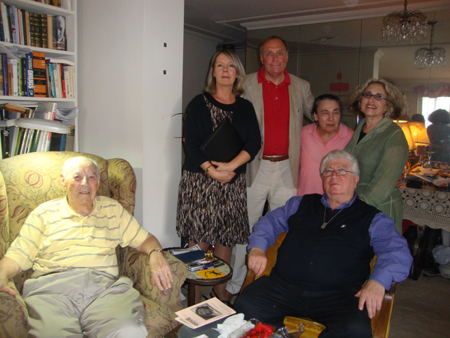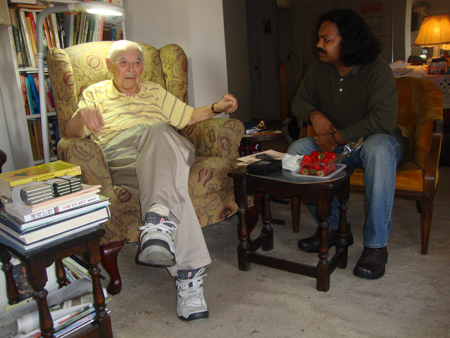|
|
An Interview with Gregory Rabassa
I don’t pay much interest to the technocrats of translation. They don’t make much sense; it’s like they’re driving a car when the real translator is riding a horse; nit-pickers can turn out some awful stuff.
—Gregory Rabassa
|
|

Gregory Rabassa (front left), Maria Bennett, Bill Wolak, Clementine Rabassa, Bebe Barkan
and Stanley H. Barkan (front Right)
“The Past Is Prologue”
An Interview with Gregory Rabassa
by Maria Bennett
(Conducted under the auspices of Cross-Cultural Communications,
Stanley H. Barkan, Publisher)
The poet Muriel Rukeyser once said that the universe is made of stories, not of atoms. For world-famous translator Gregory Rabassa, life and work have formed an interconnected net of stories, jewels in Indra's web, which he and his wife Clem graciously spread before us recently on a sunny afternoon in September. Born in Yonkers, New York in 1922 (not far from Ella Fitzgerald's home, where a bronze statue of the jazz legend stands today), the former OSS cryptographer rose to literary fame with his translation of One Hundred Years of Solitude by Gabriel García Márquez, winning the PEN Translation Prize in 1977 for his work, which García Márquez cites as being even better than the original novel in Spanish. The list of writers he's worked with over the years sounds like a Who's Who of Spanish and Portuguese-language superstars: Cortázar, Lezama Lima, Vargas Llosa, Machado de Assis, Lispector. He's got lots to say about them in his memoir of the translating life, If This Be Treason, which won the PEN Art of Memoir Award in 2006, but his best stories, I think, haven't quite been set into print yet on the turquoise Olympia manual typewriter which sits aside a stack of books in his Upper East Side living room. Although it must be tough to supply a steady stream of ribbons to the antiquated gem, Rabassa prefers it to a computer, and it's a delight to imagine him in the future pecking out the story of dancing with Marlene Dietrich at an OSS party in Algiers or hitchhiking from Dartmouth, his alma mater, down to New York City to the Onyx jazz club, where he'd enjoy the likes of Leadbelly, sax man Brew Moore, and Charlie Parker. And there's always the story of how he wooed his darling Clementine, a wonderful artist and co-conspirator in his crime of translational treason (it was Clem who came up with the brilliant notion of rendering the Guaracha of La Guaracha del Macho Camacho by Luis Rafael Sánchez as Macho Camacho's Beat, keeping intact the music and dance reference which would have stymied other translators). But today, he's content to settle back into a comfy armchair, with the Egyptian Book of the Dead (on the short list of favorites) at hand, and share his views on the role of translation, or, as he puts it, the work of the “journeyman.”
Maria Bennett: We’d like to ask you about your long and extraordinary career as a translator; some questions you may have been asked before, but they come from writers very much interested in your work. I’ve always wondered, given the enormity of the number of pieces you’ve translated, which of them posed the greatest challenge?
Gregory Rabassa: Actually, the most challenging work I’ve done was to decode and translate messages during World War II about the surrender of the Germans in Italy. Some were in German, which was a stretch. My work as a cryptographer at that time was experience in translation as well. In terms of literary translations, however, the most challenging or difficult work was Lezama Lima’s Paradiso. It was a difficult book to read, too, so the sheer complexity of the novel was certainly an issue in its successful translation into English. It was like translating Joyce. I’ve read more difficult books, but never had to translate them. It was fun, though. Books are like a puzzle sometimes; the difficult ones are more fun to translate.
Beverly Matherne: “Does someone who doesn’t know a language really have the right to work as a translator of the work of a writer in that language? Or perhaps with a “partner in crime” who does?
GR: Only in a sense; technically, no, but, actually, yes. I don’t pay much interest to the technocrats of translation. They don’t make much sense; it’s like they’re driving a car when the real translator is riding a horse; nit-pickers can turn out some awful stuff.
BM: Can a person be considered a translator if not a native speaker?
GR: I guess to a degree, as it’s not a good example by holding a word to a narrow meaning. Maybe we should use another term for that person. Or maybe translators could be graded into first-class, second-class, and so on. The translator in question must know something of the land in addition, and realize there’s poetry in every word you use, and certain favorite words we have, as well.
Stanley Barkan: Why haven’t you worked on poetry? You stay away from it by working on novels.
GR: It’s more difficult, I believe. It takes more thought. Besides, I like my old-fashioned poetry. I couldn’t have ever translated Shakespeare into Spanish; it’s not just words. And when you see contemporary poetry, it would be a hell of a job. Now, if you took a book and broke it up into stanzas, it might work.
MB: You tell others you don’t read an entire work first when you begin your process of translation. How is that a method as such? Others would read the whole book first.
GR: It works quite well because it’s not a method, it’s an act. You get tied down in a method. For one thing, think of the past, present, and future. When you translate a book, it’s entirely in the present, because you haven’t read it entirely yet. If I go back and read it, the present is no longer the present, it’s past. It’s hard to describe the difference, but it’s more like old Latin courses when you had to just translate pieces to learn the language. You go along, but you don’t know what the future is. It’s more of a mystery; it’s a challenge because you’re reconstructing something. Yes, it calls for more attention, too, working with the words themselves rather than a system. How do you arrange those words? That’s the question.
SB: Why have you focused exclusively on Spanish and Portuguese?
GR: They were there. And I was teaching them. I had never worked in French, but had studied it a lot. If I had taken my Ph.D. in French, then, yes, I could have done work in French and in other languages. The only reason I worked in Spanish and Portuguese was they were handy. I always studied Latin, which is a complex language. And I learned Russian, which folks said was so hard, but I thought it was easier than Latin. With Latin, I felt boxed in by grammar. But the early training was helpful, since we had to translate a chunk of text into good English. They don’t do translation in language classes anymore; we also had to order a cup of coffee as part of our studies, but that came later.
MB: What languages do you wish you had studied?
GR: Definitely, Middle Kingdom! (Pointing to the copy of The Egyptian Book of the Dead that sits at his side) I could have worked with Proust, I think. I always liked him very much; it was too late when I thought about dabbling in his work. I’m rereading him now and enjoying it.
MB: Are there any other “books that got away” or authors you look back on and say, “I really should have worked with him or her?”
GR: I thought about Guimarães Rosa a lot, the Grande Sertão: Veredas (translated by Harriet de Onís as The Devil to Pay in the Backlands). It’s a lot like Finnegans Wake.
MB: Has the Wake been translated?
GR: Someone said Finnegans Wake is itself a translation! I know that Ulysses was done by the Brazilian Antonio Houaiss, who put together a dictionary and who was actually a linguist. He’s great with wordplay, but some of the poetry is missing. There’s only so far you can go with works like that, since the gap between languages is always there.
SB: Which award, of the more than fifty you’ve received, means the most to you?
GR: In prestige, the National Medal of Arts was most important to me; the other was the PEN translation medal given by my peers. I feel as if I’ve come full circle; I got the first of these awards, but in May I got to present the latest to Margaret Sayers Peden, a great honor to a friend and colleague I’ve known for years, so I think it’s the one I like the best.
MB: A writer in the New York Times a few years ago said, “If Rabassa had become a brain surgeon, we’d never have readable translations of the best works of Latin American Literature. Could that have been on your playlist of career choices?
GR: No, if I’d gone into medicine, it would have been a fairly good job, but not the one for me. I probably could have done it, but I don’t know how good I’d have been.
MB: Lucky for us you didn’t!
Kyung-Nyun Kim Richards: What advice do you have for aspiring translators who are just starting out?
GR: Be a brain surgeon! You’ll make a whole lot more money! Oh, brother! (laughter all around)
MB: The Times writer also says, “He has a head of white hair that he wears like a crown.” If so, are you the king of Latin American literary translation?
GR: The crown is worn, that’s for sure! Maybe that’s what he meant, a crowned head.
SB: Uneasy lies the head that wears the crown!
MB: But in many ways, it’s true. Think of Cortázar’s Rayuela (Hopscotch, Rabassa’s first foray into book translation), García Márquez and the whole Boom in the Sixties. If you hadn’t done those seminal translations, America wouldn’t have known that genre. You were in the right place at the right time.
GR: Yes, One Hundred Years of Solitude got a very broad reception. But folks have forgotten it a bit these days. If they hadn’t, they would have noticed that the well which exploded in the Gulf was called “Macondo.” And where did the oil go? It drifted to Baratería, which was Sancho’s island. The whole Gulf oil mess was literary!
SB: I’ve been wondering if you prefer to work in Brazilian literature or mainland Portuguese?
GR: I prefer Brazilian. I’m like an adopted Brazilian, so I make fun of the Portuguese. Their language is very tight because Portugal is a little country; they have little room to branch out and address others. Brazil is huge, however.
MB: I know you enjoyed sharing recordings of jazz with Julio Cortázar, and that you both loved the innovative work of Charlie Parker. I was thinking you might have some thoughts on the link between music and the translator’s art.
GR: There may be a relation between notes and ideas. But I suppose you’d have to choose an instrument. In the old days, I used to hitchhike from Dartmouth to 52nd Street to hear jazz. With truck drivers, it was safer in those days. I’d go to The Three Deuces and Kelly’s Stable, and later to the Village to The Open Door, which is now part of NYU Law School. I also remember seeing Leadbelly at The Village Vanguard, and Brew Moore, the tenor sax player. I had a white piano in my first apartment, but never learned to play it.
MB: What was your biggest mistake, if any, as a translator?
GR: I probably made lots of little ones, but nobody has found them yet. I can’t think of any book I shouldn’t have done because I like them all, even the turkeys! And with Asturias, the only thing wrong was he didn’t have Maxwell Perkins around to cut his work up a bit. I was a bit unhappy with the translation they came up with of the title of Bras Cubas as Epitaph of a Small Winner; they also changed Quincas Borba, too.
MB: Why did they change Bras Cubas so much?
GR: They felt they were looking down on this inferior cultural place in Latin America in those days, I think.
MB: I often wondered how you ever came up with the title of Macho Camacho’s Beat from La guaracha del Macho Camacho by Luis Rafael Sánchez from Puerto Rico. It’s perfect, as it’s got the beat of the musical guaracha right there.
GR: Well, the translator is sitting right over there! (Pointing to his wife, Clementine) And the beat has two meanings, the cops’ beat, too.
Clementine Rabassa: We were sitting on Luquillo beach in Puerto Rico discussing it with the author, and we couldn’t resist it. I loved to dance to Latin music during the era of Tito Puente, and it’s so much a part of the culture that it was important to keep the music in the title of the book.
MB: Clem, how much have you helped your spouse in his work?
CR: Some, but not much. Since 1966, I’ve kept him off the streets. (She laughs)
MB: And I imagine his work as a professor at CUNY has, too. I can remember in the Eighties when I was a student at the CUNY Graduate Center in the Comparative Literature Program; the first thing other students told me was that I should register for Prof. Rabassa’s class in Translation because it was so popular that enrollment closed quickly. It was, I did, and it was the most engrossing weekly session I can remember. You were adored by your students, you know. Your stories really shed light on the weaving of the translator’s web. How did you ever find the time to teach and do your work in translation?
GR: I’m not a researcher. I’d first sit down and do my translations, and since I’d read the books I was teaching, I could just go into class and talk. You know, when they asked me to write a book about translation (If This Be Treason), I thought I did, but they called it a memoir instead, since there were so many stories. I believe someone called me a garrulous old coot! (Laughter)
Hassanal Abdullah: Can you tell us how the teaching of translation has changed?
GR: My intent was to talk about it, because I believe that you can’t really teach it. The physical part is the active editing of a translated text. I can’t say how to do it, but I can help a student to reframe it. And you know, Hassanal, I love your alphabet.
HA: My language is something for which students were killed in 1952 when the Pakistanis wanted us to use Urdu.
GR: García Márquez has a beautiful description of the Sanskrit alphabet in One Hundred Years of Solitude. He says, “The letters are strung together like clothes to dry.”
HA: One Hundred Years of Solitude—was it the first book of his? How did you come to this book?
GR: At the Center for Inter-American Relations, they ran a cultural division to get translations of Latin American books into English. García Márquez had become very big, so they said, “Let’s get this into English.” They wrote to different publishers, and Harper and Row, with Cass Canfield Jr., got involved. Since I’d done some translations already, they asked me if I wanted to handle the English version of the book.
HA: My wife and I both said that the translation of this book is almost richer than the original.
GR: García Márquez said that, too; I said, in my modesty, that the praise goes to the English language. It’s a book that should’ve been written in English. It’s like Shakespeare’s sonnets; they were there and Shakespeare came along and put them down in a way no Frenchman could have.
SB: I remember that the question for you was always, “Do you have enough Spanish?” But you retorted, the question is “Do I have enough English?”
GR: The past is prologue, I guess.
HA: You also write in English. Were you raised in a bilingual home?
GR: Not really. My dad came to NY in his 20s and became a New Yorker. Cubans are quick to pick up on the culture they’re in. When he cut his finger, he’d curse in Spanish, but he was pretty good in English, too. I can still hear his voice say “God dem!” sometimes.
HA: Would a bilingual home have made a difference to your work?
GR: Yes, it would’ve been different. The psychology of cultures made me feel like more of an outsider. My father was a double exile, and my mother a single one, because he was exiled from Cuba, then became a New Yorker and finally moved to New England. My mom was a New Yorker and looked at the way people did things up there and thought it was a bit strange; so we kids felt exiled, too.
HA: Can you talk about translation in a literal manner versus translation to make a richer version of a piece?
GR: I don’t know that there’s that much difference, but I’d say that literal translation is bad translation; something is always left out. It’s spiritual or instinctive; you think it may be only in English, but it is in other languages, too.
SB: Like the taam (taste/flavor).
GR: Literal translation is more like a dictionary, but I love to read dictionaries. If we looked at what happened to the Tower of Babel, we’d never get anywhere.
HA: Do you think that translators are honored as they’re supposed to be all over the world?
GR: As they deserve? No. They are journeymen, people who fill a need but don’t do anything more.
SB: If there were a Nobel Prize for translation, you’d be the first to receive it.
GR: I won’t get it because they don’t give it posthumously!
HA: Stan has been doing publications all over the world in 53 languages (But who’s counting?), and you have been involved with him for quite a while. Can you say a little about this?
GR: That would take a long discussion, because when Stan comes out with a book, my first inner impression is to shake my head and say, “How can one person do this?” Then I see him and see how there are those who would deny it, but I see a very relaxed person, although he may huff and puff. I wish that somehow his publications would make a bigger impact on the mainstream, but that’s the problem of translating works that are not “common” enough. Mediocre stuff sells. The foreign book that sells the most is The Alchemist, a potboiler.
Bill Wolak: Tell us about World War II.
GR: It’s classified. (Laughter) I’m only teasing; one of my comrades was Jim Black. They gave us all instructions to give name rank and serial number if captured. Jim pondered that and said, “I’ll tell them everything I know, but I’ll bore them with the details.” I was in Italy and North Africa. I handled the surrender in Italy, dealing with Karl Wolff, the SOB who was head of SS in Italy. We went to Yugoslavia to bring out downed pilots who were bombing Romanian oilfields. The partisans would get them and gather them together and we would go in and try to get them to Italy.
BW: Did decoding help you in translation? I teach poetry and tell students to decode it; once you get past the code as simile and metaphor, it’s OK.
GR: The first step was translating English into English; if you got a message from the field, the codes were so damn simple and primitive that any German could’ve gotten them and broken them. In case clear text got out of the message center, you had to change it, so every message had to be paraphrased It was tough; you had to work it in such a way that if they got it, it would take ‘em longer. Things like “order of battle”—it was hard to make it complex, so we used ciphers and had to be good with synonyms.
BW: Do you still enjoy the work of translation?
GR: I don’t know I ever enjoyed it. I did it, but got stuck in it and got drafted into it.
BW: What gets you to this tiny manual typewriter?
GR: I get the urge and go to it when conscience gets to me. There’s an Eça de Queiroz story of Saint Christopher there right now. I often do my own writing in longhand, but for me, translation is easier with the typewriter. This one has been to Brazil several times; when I get to one end I have to pause, take the spool and rewind it. There’s still a place on Third Avenue where you can get a ribbon. I usually buy a couple because I don’t want to learn to use the computer. It’s a distraction.
BW: What’s your daily routine like these days?
GR: I may work in the daytime, but at night, we like to watch old movies on TCM. I watch news on Channel 21, usually the NewsHour with McNeil. The beauty of TCM is they don’t advertise anything except their own stuff.
HA: You know, the Indians, mostly Hindus, believe in reincarnation. What would you be in your next incarnation?
SB: A brain surgeon!
GR: If I had anything to do with it, I’d be reincarnated as God. Then I wouldn’t have anything to worry about. Better than Medicare! Or maybe a creature in the universe far beyond the telescope.
SB: You have taken us on a journey of past and present. Obrigado! Many thanks!

Gregory Rabassa and Hassanal Abdullah, the editor, Shabdaguchha
Also Present:
Clementine Rabassa (Rabassa’s poet/translator wife)
Participating Interviewers: Maria Bennett (Poet/Principal Interviewer)
Hassanal Abdullah (Bengali Poet/Editor of Shabdaguchha)
Stanley Barkan (Poet/Editor/Publisher of Cross-Cultural Communications)
Bill Wolak (Poet/Photographer)
Not Present (but having sent questions to be asked by Maria Bennett):
Beverly Matherne (Cajun Poet/Translator)
Kyung-Nyun Kim Richards (Korean Poet/Translator)

|
|



